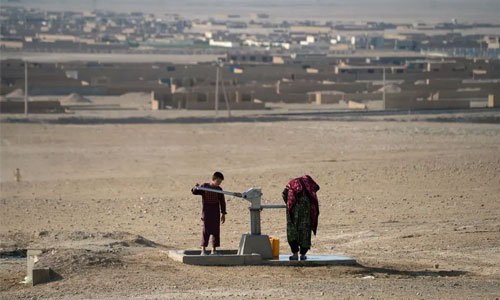Undoubtedly, Water is one of the most essential elements of life. It is known as an important factor of health and civilization of a human society. No country or city can maintain its economic, political and social stability without maintaining its water infrastructures. Although Kabul city suffers from various issues such as absolute poverty, addiction, insecurity, electricity shortage and so on, water scarcity is not less serious than other problems. For example, the terrorist attacks may take the lives of few people but if the current water crisis continues, millions of people will be compelled to leave Kabul city or die due water contamination. Therefore, it seems that water crisis is an unknown or forgotten problem in Kabul city. Every year, when entering into summer season, the water shortage is also raised. These days, many of people are begging water from mosques, neighbors or try to move into areas which have not dried yet. According to experts, Kabul has only 29 million cubic meters of water, while the city’s residents need more than 100 million cubic meters. Thus, it is said that annually around 22 meter of Kabul underground water is dropping while there is there is no strategy for the growing problem.
There are many factors behind the growing crisis but the most important factors are consists of increasing population, lack of green area, overexploitation, and also mismanagement of water resources, water wastage, water contamination, and climate change. Though it is hard to have control over climate changes but it is possible to increase the green area, improve the water management and prevent from wastage of water. The fact is that there is no serious supervision over the water wells in Kabul city. The depth of drinking water wells reached from 20m to around 350 m and those who are in a good economic condition digs up to 350 meter personal wells and consume water as much as they wish regardless of what is going on in their neighborhood. As a result, thousands of wells have been sunk in Kabul city while the numbers of population are increasing due to unemployment, security issues and other internal displacement factors.
As pointed out, one of serious factor behind the issue is overpopulation. It is said that Kabul the fifth growing city in the world increasing from few hundred thousand populations to estimated seven million people. Unfortunately, most of social and economical services are centralized in large cities which attract a lot of people from remote villages. Thus, unemployment and insecurity in the provinces are of the other factors which caused Kabul to be one of fastest growing city in the world. Therefore, Kabul city has not only hosts millions of people who are unfamiliar with the culture of urban life but also host millions of unemployed people who are struggling for self-preservation. The self-preservation factor compels them to loot or kill others so as to earn a living. Therefore, it has not only faced with water crisis but also problems such as social crimes, being unmapped, air-pollution, environmental challenges, over traffics, poverty and unemployment and so on.
The next most serious factor is mismanagement or lack of control on water misuses. In some part of city many are faced with grave water crisis but in other parts of city a lot of water is wasted on washing cars, watering farms of vegetables or trees and so on. Few years ago one cubic meters of water was sold in about 20 Afghani but now it has reached up to 80 Afghani. Because no supervisions many private businesses such as water purifying companies, public baths, carpet wash companies, rich families and so on are extremely overexploiting water. Thus, many producing companies transfer water from Kabul to others small towns or cities while it must have been vice-versa. Thousands of farms and trees are watered by fresh water while it is possible to be watered through sewage system. Overall, the shortage of water is a forgotten problem in Kabul and so the government needs to invest in water infrastructure with devising a comprehensive plan. However, in previous years, the government had informed of some good programs such as construction of a water dam in vicinity of Kabul, but the practical process of this program is too much slow or remained on the paper only. For example the foundation of the Shah-wa-Arous dam project was laid in 2010 yet it has not satiated the thirst of Kabul city.
Consequently, both people and government should try their bests to do their respective responsibilities. People should be cautious about water consumption as well as refrained from polluting water everywhere in the city. We should note that water in Kabul is not just scarce; it is also unsafe, especially for drinking, cooking and general household use. Once it was quoted from a team of BBC Persian journalists when they tested Kabul’s water in the Ministry of Rural Rehabilitation and Development (MRRD) laboratories they found at least 20 harmful bacteria in the 100 millimetres (mm) they sampled at two locations in western and northern parts of the city. Therefore, the government should create a comprehensive strategy to prevent from the future water shortage and water contamination which has already challenged the whole Kabul residents. Accordingly, the government needs to make bigger plans to control Afghanistan’s water while these plans should be implemented in the framework of a clear water policy.
Home » Opinion » Water Shortage: A Forgotten Problem in Kabul City
Water Shortage: A Forgotten Problem in Kabul City
| Mohammad Zahir Akbari

